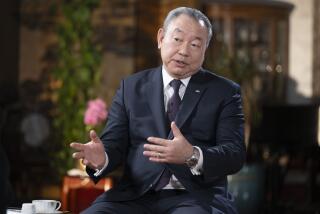U.S. Views Bright Side of S. Korean Vote
- Share via
WASHINGTON — WASHINGTON -- The Bush administration sought Thursday to banish any perceptions that a frowned-upon candidate had won the South Korean presidency, stressing its eagerness to work with President-elect Roh Moo Hyun to improve U.S.-South Korean relations.
“The United States continues to have very strong and good relations with the people and the government of South Korea,” presidential spokesman Ari Fleischer said. “We’re friends and we’re allies.... It is the role of America’s great democracy to honor and respect the elections of every nation in the world and work with those leaders.”
Senior officials downplayed differences between the Bush administration and Roh, whose campaign speeches advocated a softer, diplomatic approach to North Korea. The losing candidate, conservative Lee Hoi Chang, has for years called for a tough stance against the communist state. He was thus seen as a more sympathetic interlocutor for the Bush administration, which demands that North Korea renounce its nuclear weapons program as a condition for negotiations.
“We view his election as an opportunity to work with him and his government to build an even stronger relationship between our two countries for the new century,” said James A. Kelly, assistant secretary of State for East Asian affairs. Kelly confronted North Korean officials in October with U.S. suspicions that Pyongyang had a secret uranium enrichment program, and described himself as shocked when the officials admitted it.
“President-elect Roh has also expressed his strong support for the U.S.-Republic of Korea alliance as a deterrent against the threat from North Korea, and for the regional stability that the alliance provides,” Kelly added. “Together we hope to further modernize and improve this alliance.”
Kelly also downplayed the anti-American flavor of the South Korean presidential campaign, instead presenting it as a generational changing of the guard to which America must adapt. He could hardly have been more diplomatic Thursday as he recalled the not-so-distant days of South Korea’s military dictatorship and lauded the nation’s democratic transformation.
Noting that South Korea is “the single country in the world most connected on the Internet,” Kelly added: “These are technically competent, sophisticated people, and yet it was only 15 years ago we were wondering about a presidential election -- there was doubt whether there would even be a presidential election, whether if the ‘wrong’ candidate was somehow elected, the army was going to let that stand.” Kelly was referring to a 1987 crisis in which strongman Gen. Chun Doo Hwan tried to dictate election rules in order to ensure that the presidency went to a military successor. Massive street demonstrations forced Chun to allow direct presidential elections.
Once Roh names his Cabinet, U.S. officials “will sit down and look at them face to face and find out what it is that we agree on and what it is we disagree with,” Kelly said.
Fleischer insisted that it has always been President Bush’s position that the South Koreans, the Japanese and other neighbors should be the ones to persuade North Korea to give up its nuclear program. Fleischer rejected the notion that there is “daylight” between the administration’s position and Roh’s policy of dialogue with the North.
More to Read
Sign up for Essential California
The most important California stories and recommendations in your inbox every morning.
You may occasionally receive promotional content from the Los Angeles Times.













